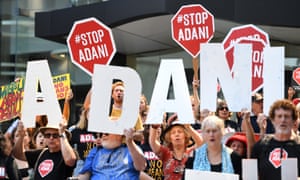Extract from The Guardian
Exclusive: sticking point in negotiations likely to
be increasing the capacity of the existing Goonyella to Abbot Point line
to carry coal from Galilee Basin
The Queensland
freight rail operator Aurizon is understood to be in discussions with
Adani that will hinge on who pays for upgrades to the existing rail
network, as the Indian mining company tries to resolve significant
elements of its scaled-down plans.
Aurizon had planned to build a rail line linking the Galilee Basin to the Abbot Point port near Bowen, but confirmed last week it had “no plans” to pursue that proposal.
Last month Adani announced it would also abandon plans to build a direct rail line from its planned Carmichael mine to Abbot Point. Instead, Adani plans to build a spur line from its proposed Carmichael mine that would connect to the Aurizon network.
Aurizon is legally obliged by the Queensland Competition Authority to consider and assess the request by Adani to access the network. Both companies are bound to keep discussions about access confidential. But Guardian Australia understands the sticking point is likely to be who would pay for necessary upgrades to the Aurizon-run Goonyella railway.
The capacity of the existing Goonyella to Abbot Point line would need to be increased to carry coal from Carmichael, based on current freight volumes. The line has capacity to freight 50m tonnes per annum and currently carries about 28mtpa for companies that have contracts to export through the Abbot Point terminal.
Adani plans an initial expansion of Abbot Point to 60mtpa and plans to ultimately mine and export 27mtpa from Carmichael. The Goonyella line does not have the capacity to service an expanded port, or the Carmichael mine at peak production.
Adani also says its planned spur line will have additional
capacity to provide access to other potential future mines in the
Galilee Basin. Any additional coal freight from the Galilee would
necessitate a more significant upgrade of the Goonyella railway.Aurizon had planned to build a rail line linking the Galilee Basin to the Abbot Point port near Bowen, but confirmed last week it had “no plans” to pursue that proposal.
Last month Adani announced it would also abandon plans to build a direct rail line from its planned Carmichael mine to Abbot Point. Instead, Adani plans to build a spur line from its proposed Carmichael mine that would connect to the Aurizon network.
Aurizon is legally obliged by the Queensland Competition Authority to consider and assess the request by Adani to access the network. Both companies are bound to keep discussions about access confidential. But Guardian Australia understands the sticking point is likely to be who would pay for necessary upgrades to the Aurizon-run Goonyella railway.
The capacity of the existing Goonyella to Abbot Point line would need to be increased to carry coal from Carmichael, based on current freight volumes. The line has capacity to freight 50m tonnes per annum and currently carries about 28mtpa for companies that have contracts to export through the Abbot Point terminal.
Aurizon said it could not comment on any potential access request by Adani or subsequent discussions with the company due to confidentiality restrictions put in place by the QCA. But the rail operator did provide a statement that explained the process if any expansion to its infrastructure was required.
“The process includes assessment of potential future demand from other users of the particular coal system; and the scope of expansion required, how it connects to the network and how it will be funded,” a spokesman said.
Analysts told Guardian Australia last week that Adani was pursuing an “ultra-capital light” plan to start its Carmichael mine, committing as little up-front capital as possible. The head of Adani mining in Australia, Lucas Dow, gave a series of interviews in which he hinted the mine was weeks away from securing finance.
But significant elements of the project remain unresolved. They include whether the company can strike a royalties deal with the Queensland government, and whether Adani would self-fund the project or be able to obtain outside finance.
Another two Korean financiers, the National Pension Service and Mirae Asset Daewoo, which recently helped Adani refinance the Abbot Point coal terminal, have joined several others in giving assurances they will not be involved in the project.
Adani’s latest plan relies entirely on being approved for access to the Aurizon network.
At the rail company’s recent AGM, chairman Tim Poole said Aurizon was wary of “stranded asset risk” and that “at some point in the next 50 years, renewable energy might be such that we might not be hauling as much thermal coal as we are today. ... part of our system might not be required.
“It’s important to note that we are an open access regime,” Poole said at the AGM in relation to questions from activist shareholders about Adani. “We are obligated to assess that proposal. We also have a series of other obligations, one of which is confidentiality.
“But you can imagine that in relation to any proposal to get access to the system we have to look at a range of factors ... we need to look at whether it’s coming into [or] accessing our existing operations or whether there’s a new development required and a range of other factors.”
Earlier this year, Aurizon withdrew an application for funding under the Northern Australia Infrastructure Fund to build its own rail line to the Galilee Basin.
In August, its website proclaimed: “We have a keen eye for growth and we’re investigating the huge potential of Queensland’s last vast coal reserve in the Galilee Basin. We continue to work on a proposed infrastructure solution”.
That section has since been removed. When asked why, Aurizon said: “We have no plans to re-start our infrastructure proposal for the Galilee, but we are on the record as supporting the development of the Galilee Basin, that has not changed.”

No comments:
Post a Comment